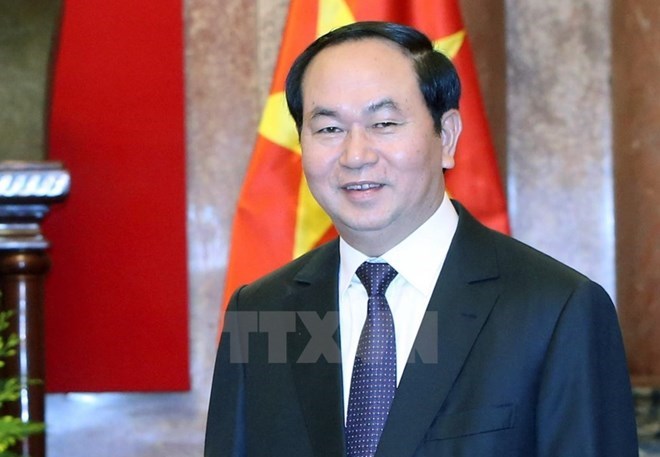
State President Tran Dai Quang highlighted huge potential for Vietnam-Japan cooperation across the fields, noting that the Extensive Strategic Partnership between the two nations is flourishing.
 |
| President Tran Dai Quang. |
State President Tran Dai Quang highlighted huge potential for Vietnam-Japan cooperation across the fields, noting that the Extensive Strategic Partnership between the two nations is flourishing.
In a recent interview granted to the Japanese newspaper Yomiuri Shimbun, the Vietnamese President affirmed Vietnam and Japan have become important partners of each other in many fields.
Since the two nations upgraded their ties to the Extensive Strategic Partnership for Peace and Prosperity in Asia in 2014, bilateral relations have witnessed strong and comprehensive development, he said.
Regards political ties, the two sides have maintained high-level meetings, with the highlights being visits to Vietnam in 2017 by Japanese Emperor Akihito and Empress Michiko, and Japanese President Shinzo Abe. The year also marked a new development step in the relations as the two countries issued a joint statement on deepening the extensive strategic relationship during the official visit to Japan by Prime Minister Nguyen Xuan Phuc.
Vietnam and Japan have closely and effectively coordinated in multilateral forums such the UN, ASEAN, APEC and ASEM. In particular, Japan’s active involvement contributed to Vietnam’s successful hosting of the 25th APEC Summit during the year.
In the economic field, Japan is the largest ODA provider for Vietnam, and the fourth biggest trade partner of the country. In 2017, Japan became the leading foreign investor in Vietnam, with over 2,500 Japanese companies operating in the Southeast Asian country. The two countries are working together on many large-scale infrastructure and energy projects in Vietnam.
Japan’s ODA provision has significantly contributed to Vietnam’s socio-economic development.
Collaboration in terms of security-defence, agriculture, education-training and labour have also recorded practical results.
Cooperative links between localities of the two countries have been fostered with 37 pairs of localities setting up twinning relations. People-to-people exchange activities and cultural and tourism cooperation have been expanded, with 230,000 Vietnamese now living and working in Japan and 16,000 Japanese in Vietnam. Japan is the third largest source of tourists to Vietnam.
President Quang said he discussed with PM Shinzo Abe major orientations and specific measures to further bolster the bilateral ties in the time ahead on the sidelines of the APEC Economic Leaders’ Meeting in Da Nang last November.
He noted that the two sides agreed to enhance political trust via maintaining visits and meetings at all levels, and dialogue mechanisms among their ministries, sectors and localities.
They will take advantage of their respective strengths to promote win-win cooperation and economic links. Vietnam will closely cooperate with Japan for the more effective use ODA capital, while continuing to improve its investment environment to facilitate Japanese firm’s operation in the country.
The two sides will also forge links in fields of good cooperative potential such labour, clean agriculture and hi-technology, he added.
The President stressed that with its policy on proactive international integration, Vietnam has been and will be a sincere friend, reliable partner and responsible member of the international community. In that spirit, the country will maintain its close and effective collaboration with Japan at international and regional forums in issues of common concern for peace, stability and development in the region and the world as a whole.
He expressed his belief that the Vietnam-Japan Extensive Strategic Partnership will continue developing for the sake of the two people.
President Quang said in the time to come, Vietnam hopes for Japanese investment and technology transfer in six priority sectors in Vietnam’s industrialisation strategy, including electronics, agricultural machines, farm and aquatic product processing, shipbuilding, environmental protection and energy saving, and automobile industry.
Vietnam also wants to benefit from Japan’s investment and technology in fields of its strengths such as support industry, manufacturing, infrastructure development, energy, clean agriculture, waste and waste water treatment.
The President also reaffirmed Vietnam’s consistent policy to create favourable conditions for foreign investors, including those from Japan to operate business and production activities in Vietnam.
Japanese direct investment in Vietnam totaled almost 9 billion USD during January-November, 2017, a four-time increase from the figure of the entire 2016.
(Source: VNA)





